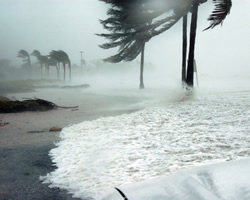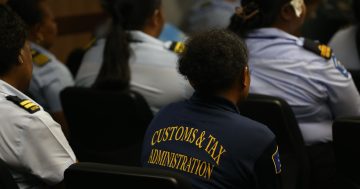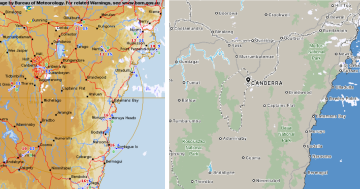Angelica Salele-Sefo* says women’s leadership is helping rural and remote communities in the Pacific Islands access early warning and disaster information.
 When a cyclone, tsunami or flood occurs, women and children are among the most affected.
When a cyclone, tsunami or flood occurs, women and children are among the most affected.
A weather and disaster preparedness mechanism called Women Wetem Weta (Women’s Weather Watch) in Vanuatu helps keep rural and remote women and communities informed of humanitarian crises at an early warning stage.
Women Wetem Weta (WWW) is an information communication system that provides a core group of women leaders in Vanuatu the information they need to prepare their communities for disaster risks in the early warning stage.
This information is shared through bulk SMSs that can be sent to numerous mobile devices at once, in the local language.
It was created following the success of Women’s Weather Watch in Fiji, which was launched in 2009.
As a result of climate change, there are increasing extreme weather events making Pacific Island communities vulnerable.
WWW is another response that focuses on women and their ability to lead in the face of disasters.
“If women are well prepared, as often they are the caregivers of other vulnerable groups such as children, elderly and people with disabilities, they will be able to lead and protect their communities and livelihoods during emergencies,” said Sharon Bhagwan-Rolls, Technical Adviser for Shifting the Power Organisation and Founder of Women’s Weather Watch in Fiji.
“Using this platform to communicate how women were preparing, what the situation of a disaster was and its local-level impact, as well as what their recommendations were in terms of recovery — combined with the use of community radio, and capacity-building women on how to use the information — we were able to build their capacity as community leaders.”
An initiative such as WWW is one example of actions being undertaken to build resilience where we can — sharing information across a network of women to prepare for challenges and disasters ahead, keeping communities safe, and acknowledging women’s role in our communities.
As Ms Bhagwan-Rolls said: “Women Wetam Weta highlights the importance of women’s leadership roles in their communities, as local and traditional knowledge holders, especially in early warning and disaster preparation.”
Officially launched in Vanuatu in early 2019, WWW is a mechanism of the preparedness and protection work of the Women I Tok Tok Tugeta forum that is supported by ActionAid Australia, FemLINK Fiji and the Australian Department of Foreign Affairs and Trade.
“Tailored support for communities such as this helps enhance our Pacific resilience, what we are striving to achieve and maintain as a Pacific region,” said Tagaloa Cooper-Halo, Director of Climate Change Resilience of the Secretariat of the Pacific Regional Environment Program.
“Having observed World Meteorological Day on 23 March, we are pleased to acknowledge this work undertaken by WWW.”
“We applaud every step that is taken to protect and keep our people, especially our Pacific women, well informed in times of natural hazards and disasters.”
This year World Meteorological Day highlighted the vital role of water for our survival, with the theme “Climate and Water: Count every drop, every drop counts”.
According to the World Meteorological Organisation, water use has been increasing across the planet by about 1 per cent per year since the 1980s.
Forty per cent of the global population is affected by water scarcity and only 0.5 per cent of the Earth’s water supply is readily available for human consumption.
“At this time, when good hygiene is required for health safety, these statistics are appalling,” said Ms Cooper-Halo.
“We must therefore conserve, manage and use water appropriately.”
* Angelica Salele-Sefo is Outreach Support Officer in Samoa for the Secretariat of the Pacific Regional Environment Programme.
This article first appeared at reliefweb.int/report/world.







